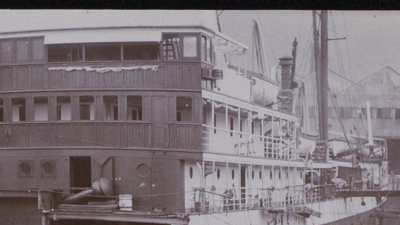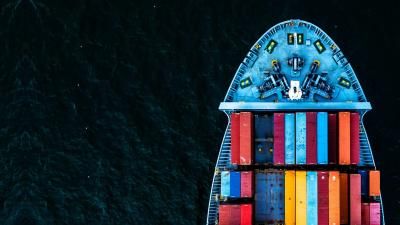
A unique international maritime collection goes online
The Lloyd’s Register Foundation Heritage Centre digitises extensive maritime collection.
This page is approximately a 4 minute read
This page was published on

of global trade is now carried across the oceans.
Maritime trade has shaped the world we live in today. From whaling in the 19th century to European colonisation and beyond, the maritime economy has driven forms of exchange, social relations, the search for oil and the formation of new trade routes, policies and maritime law. With 90% of global trade now carried across the oceans, it continues to play a critical role today.
“The sea as a space of commerce has been crucial in stitching the world together, both making it and destroying it. Learning from the past is crucial in order to understand the present and prepare for a better future,” said Laleh.
Sinews of War and Trade highlights the role new ports and shipping infrastructure has played in the Arabian Peninsula, the region and the world beyond. The book reveals how maritime transportation is not simply an enabling companion of trade, but central to global capitalism. The ports that serve maritime trade, logistics, and hydrocarbon transport create racialised hierarchies of labour, engineer the lived environment, aid the accumulation of capital regionally and globally, and carry forward colonial regimes of profit, law and administration.
“We have always survived on the flora and fauna of the sea. Seaweed, coral, fish and sea mammals have fed and festooned us for centuries,” says Laleh. “If we look at maritime history, it becomes clear that what happened many years ago has led directly to many of the dilemmas we face today. It’s only by increasing our knowledge of what happened before that we can truly appreciate why the world is as it is today.”
Today it is not only what lies in the waters but also the subsea resources that powerful and affluent countries and corporations can exploit.
Laleh explains: “When whale stocks reduced due to overfishing by the end of the 19th century and supplies of blubber and spermaceti depleted, the search for petroleum as a source of kerosene for lighting and industrial lubricants became a global endeavour. Struggles over the right to extract oceanic bounties took on a new intensity over the possibility of drawing out petroleum from the sea and subsea soil as source of fuel.”
Offshore exploration for petroleum and other mineral resources, and later the construction of offshore oil loading and bunkering terminals began in the coastal waters of the US, followed by Venezuela.
“Once the technological feasibility of offshore drilling was ascertained, rights of ownership over these resources had to be justified in order to apportion incomes, fees and profits,” says Laleh.
“What becomes clear in reading the legal case material about jurisdiction over the seas is that the sovereignty of the states in the global south is often defined and fundamentally circumscribed in the encounter with the powerful corporate bodies engaged in the capital accumulation.
“This is often according to geopolitical hierarchies which are defined in, and since, the colonial era. And in this conversation, what is often not considered are the climate or the people whose lives are most affected by this in the global south.”
The sea has been the milieu for the making of international laws around contract, prize, ownership, rights, sovereignty and trade.
But, Laleh says, “the laws have so often been subservient to the gun”.
“When one reads the proceedings of maritime conferences, it becomes clear that the meticulous language of the law often veils the reality that only a handful of powers have the requisite capital, expensive technology, strategic reach and imperial claims to lay down, for example, global communication lines, energy transport networks, or to install expensive offshore drilling rigs in deep water zones, or to navigate the furthest reaches of the world’s ocean.
“The law alone has not been able to forestall the effects of offshoring, the flags of convenience, protect seafarers or fisher people, or to shore up the stewardship of the sea or the climate.”
Horatio Clare, has himself written about his experience on travel on freighters and polar ice-breakers and has written sensitively about the way shipping transforms work and the environment. After his travels on a Finnish icebreaker he warned of a future “where the environment is vengefully dominant, forcing us to live like Finnish seafarers – behind glass, monitoring, waiting”.
His journeys on two Maersk ships across the seas (from Felixstowe to Los Angeles via Suez and from Antwerp to Montreal) brought him in contact with a range of people working at sea: seafarers, captains and engineers. His Down to the Sea in Ships ends with a reflection about how the work at sea reflects something of our stewardship of the earth.
Clare writes, “I came to feel that the lesson of the sea is that this earth is a ship, and all of us are sailors – wipers, oilers, engineers, and captains all at once. I will not forget the ways in which the good ones are gentle with each other and mighty with themselves.”
Laleh and Horatio will be speaking at The Wales Stage at Hay Festival on Saturday 27th May at 1pm. For more information please visit The Hay Festival website.